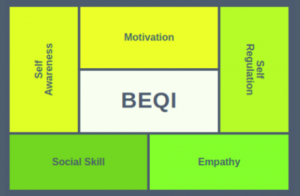BEQI Features
The Berkeley Emotional Quotients and Index (BEQI) is an open research project created at the Sutardja Center for Entrepreneurship & technology (SCET) at UC Berkeley. BEQI [bek-ee], has been designed to measure a person's ability to recognize, label, and enact change in response to their own emotions and those of others (perceived or anticipated). BEQI is also used to analyse how emotional awareness influences thinking & behavior, and how this awareness is translated into actions that lead to environments or processes that are better at promoting and achieving one's goal(s).
The following are the factor components of your interpersonal and intrapersonal intelligence level, as well as your ultimate BEQI score:
SELF (INTRAPERSONAL) MANAGEMENT: Ability to Manage Self
SELF AWARENESS: This composite measure captures your ability to recognize and understand your strengths, weaknesses, emotions, needs and drives. Self Awareness is essential for dealing with the external effects of internal states (and vice versa) and is fundamental in achieving long term goals -- as such, following are some traits commonly associated with Self Awareness.
-
- A deep understanding of one's own strengths, weaknesses, emotions, needs, and drives.
- Awareness of external effects on internal states.
- Ability to work with 'difficult' people because of one's own capacity to understand the effects others have upon their own moods and behaviors.
- A clear understanding of long term goals.
- Self-confidence, awareness of one's own capabilities, and an ability to play to their strengths -- without over committing.
SELF REGULATION: This compound metric represents your capacity to control your feelings and impulses, and in turn create environments of trust and fairness. Because self regulation modulates your emotion and response to stressor(s), it plays an essential role in achieving and managing immediate and long term goals/risks. High Self Regulation scores are associated with the following traits.
-
- A person with high self regulations picks their words carefully, considers reasons and responses for failures.
- They are in control of their feelings and impulses, and can create environments of trust and fairness.
- They tend to have higher team productivity, and can influence Self-Regulation behaviors downstream.
- They have an understanding of immediate and long term goals/risks, and can regulate emotions and responses in order to ensure goals are attainment.
MOTIVATION: Motivation is a compound feature that measures your drive to achieve beyond expectations -- beyond grades, salary, and prestige. Motivation is closely associated with leadership skills, as well as with the dedicated pursuit of goals despite setbacks. A high motivation score is required for those that want to lead, as it is often exhibited in the following traits.
-
- People with high Motivation have a passion for the work itself.
- They wrestle with status quo -- are eager to improve and continue learning.
- They use score-keeping and continuously raise their self-imposed performance bar(s).
- They are committed to their organization, and are often inspirational to, and set the pace for, other employees.
SOCIAL (INTERPERSONAL) MANAGEMENT: Ability to Manage Others
EMPATHY: Empathy is a derived compound measure of your willingness to thoughtfully consider other's feelings, along with other factors in the process of making intelligent emotional decisions. Empathy tends to be most strongly represented on people that are sensitive to cultural and ethical differences. People with high empathy are strongly suited to acting as mediators/translators between people, particularly under new and/or stressful situations, and often possess some of the following traits.
-
- They voice concerns, acknowledges an other's concerns, and keeps others in the loop.
- Acts as a mediator/translator between people during social gatherings -- such as during meetings.
- Is sensitive to cultural and ethical differences.
SOCIAL SKILLS: This compound measure quantifies your mastery of social interactions in order to achieve goals -- i.e. your friendliness with a purpose. People with high Social Skills tend to have wide social networks, a knack for finding common ground with all kinds of people and, most importantly, are adept at deploying people and groups to tackle problems and challenges. Some of the following traits are common place on people with high Social Skills.
-
- They tends to have a wide social network and a knack for finding common ground with people of all kinds.
- They build, maintain, and strengthen social networks for specific deployments.
- They work and socialize with the core belief that no work is done alone, and are adept at managing teams and persuading others onto their side.

